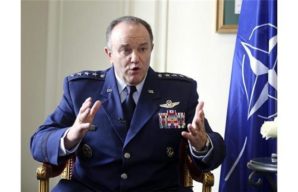

“The ability to generate lone wolf concerns has been on our radar for some time, because these are the hardest to get after, the hardest to find. We are able to use networks, to attack networks, but lone wolves don’t plug into networks and so it’s a tougher problem. And you’ve seen some increased security across many of the European nations to be able to secure venues and events and things to address these lone wolves”, said General Breedlove.
On November 3, 2014 General Philip Breedlove U.S. European Command Commander and NATO Supreme Allied Commander Europe gave a press briefing at the Pentagon regarding the war against the Islamic States group, also known as The Islamic State of Iraq and Syria (ISIS).
In one particular instance the general responded to a reporter’s question about “lone wolf attacks” and “non metallic bombs.”
“Question: General Breedlove.
Can I ask you to update your latest comprehensive thinking about ISIS and the security threat that Islamic militancy poses on a couple of key points, when you look at it, a couple points.* The threat of a lone wolf attack? The sense that ISIS, after several weeks of airstrikes, is actually increasing successfully its recruiting and that effort to recruit people with European passports? Your worry that ISIS, the Khorasan Group can get non-metallic bombs made and potentially back through European security and on to the United States? Do you still believe in your mind, your sense of it, that the Khorasan Group remains a threat to Europe in that perspective?
GEN. BREEDLOVE: So, a broad question. Let me see if I can pick it all apart.
Clearly, ISIS remains a concern. As the European Command commander and as the Supreme Allied Commander Europe, in my NATO hat, this is a problem because we have many nations who have multiple fighters in the area who are being radicalized, and then we’re going to face them when we come home.
So ISIS is a dual problem to us. First of all, it’s a problem along our allies’ border in Turkey. Second of all, it is a problem because the foreign fighters generated there come back to Europe. As you saw, we had one return to Belgium and do damage and then quickly across an international border into France.
This opened everybody’s eyes to what is a big problem of we have to worry about them all, not just the ones nation-by-nation.
So ISIS is a problem.
The ability to generate lone wolf concerns has been on our radar for some time, because these are the hardest to get after, the hardest to find. We are able to use networks, to attack networks, but lone wolves don’t plug into networks and so it’s a tougher problem. And you’ve seen some increased security across many of the European nations to be able to secure venues and events and things to address these lone wolves.
The issue of recruiting is a real problem. I think that I sign up to a broad series of works and thought which says when we get moderate Muslim voices coming from the mosques that speak out against these atrocities that we see in ISIS and others, that will help us with recruiting. It’s hard to address recruiting until we begin to address those hearts and minds, and I believe that that starts with those good, moderate voices of Muslims across not only Europe, but the United States and other parts of the world.
To the Khorasan Group, it’s bigger — the threat that you mentioned about these technical capabilities, it’s more than the Khorasan Group. Clearly, there are other elements of Al Qaida and other threats that are looking for those ways to thwart Western defenses. And, yes, they are still a threat.”
Source: DoD. For full transcript of General Breedlove’s comments http://www.defense.gov/Transcripts/Transcript.aspx…
* Note: A lone wolf is an animal or person that generally lives or spends time alone instead of with a group. The term originates from wolf behaviour. Normally a pack animal, wolves that have left, or been excluded from, their pack are described as lone wolves.
See related article: Syria air strikes: Khorasan Group ‘were working to make toothpaste bombs and explosives that could pass through airport security ‘http://www.independent.co.uk/…/syria-air-strikes-khorasan-g…
